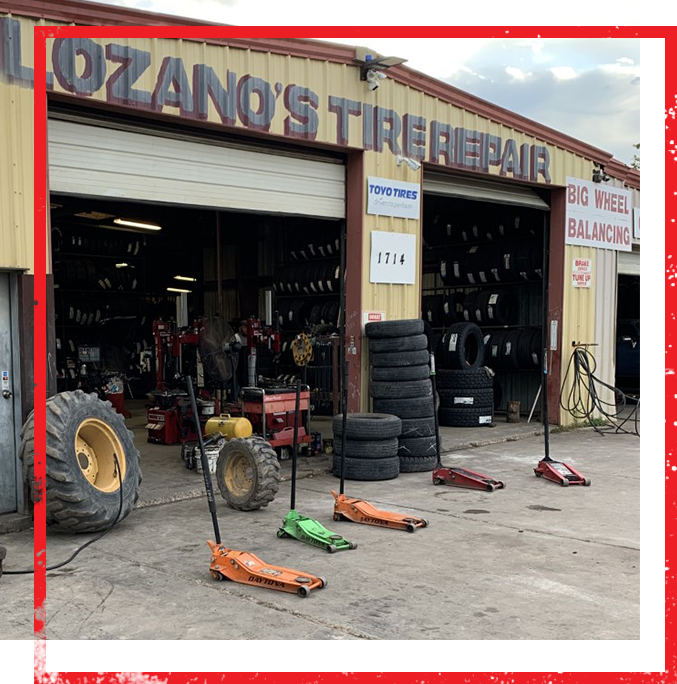Unequalled Deals at Morris Tire: Your Go-To Spot for Price Cut Tires Morris IL
Unequalled Deals at Morris Tire: Your Go-To Spot for Price Cut Tires Morris IL
Blog Article
The Environmental Benefits of Proper Tire Upkeep
Preserving appropriate tire treatment is usually forgotten, yet its influence on the environment is extensive. Proper tire maintenance not only extends the lifespan of tires yet additionally decreases land fill waste and contributes to boosted air quality.
Lowered Gas Usage
Improving tire upkeep methods can lead to a substantial decrease in fuel consumption for cars. According to the United State Department of Power, underinflated tires can decrease gas mileage by 0.2% for every 1 psi decrease in pressure in all 4 tires.
In enhancement to tire pressure, routine tire rotations and placements likewise play a vital function in fuel efficiency. Unevenly worn tires can raise gas consumption as the engine functions harder to maintain rate and traction. By preserving appropriate placement and turning tires at suggested periods, motorists can guarantee even prolong the life and wear of their tires, ultimately saving gas and lowering their carbon footprint.
Extended Tire Lifespan
Extending the life expectancy of tires is a key facet of effective vehicle upkeep practices that can yield expense financial savings and ecological benefits over time. By appropriately keeping tires, motorists can considerably extend their usability, reducing the frequency at which new tires require to be made and old ones disposed of. This not only conserves beneficial resources yet additionally reduces the energy and exhausts related to tire manufacturing and disposal processes.
Routinely checking tire stress, revolving tires, and making certain correct positioning are vital steps in extending tire life-span. Appropriate walk depth is vital for ideal grip and safety and security, however it likewise contributes in the length of time tires can be used prior to requiring replacement. Furthermore, staying clear of aggressive driving actions that speed up tire wear, such as rough stopping and sharp turns, can even more improve tire sturdiness.
Inevitably, boosting the longevity of tires with proactive upkeep not just benefits the setting by decreasing waste and saving resources however also leads to cost savings for car proprietors by delaying the demand for new tire acquisitions.
Reduced Discharges Output
Efficient tire upkeep methods add to a reduction in exhausts result, aligning with environmental sustainability objectives in the automobile industry. Effectively inflated tires, frequently rotated and aligned, can improve gas effectiveness, therefore lowering the total carbon dioxide emissions from vehicles. When tires are underinflated, the engine must work harder to drive the car, bring about boosted gas intake and greater emissions. By keeping optimum tire stress levels, vehicle drivers can assist mitigate these unfavorable environmental influences.
In addition, properly maintained tires additionally boost grip and reduce rolling resistance, better improving gas performance. This, in turn, minimizes the quantity of exhaust gases launched right into the ambience. In addition, guaranteeing tires are appropriately blown up and lined up can expand the life-span of the tires, lowering the frequency of tire substitutes and the associated environmental costs of tire manufacturing and disposal.

Reduced Land Fill Waste
Given the positive effect of proper tire upkeep on lowering emissions output, another substantial environmental benefit is the possibility for lowered garbage dump waste. By making certain that tires are correctly inflated, lined up, well balanced, and revolved frequently, their life-span can be dramatically prolonged.

Improved Air High Quality
Enhancing air high quality via correct tire maintenance techniques is a critical aspect of sustainable ecological stewardship. When tires are underinflated, they produce a lot more moving resistance, bring about boosted gas consumption and greater exhausts of harmful pollutants such as carbon monoxide gas and nitrogen oxides. Correctly inflated tires not only boost gas efficiency but also lower the amount of contaminants launched into the air.
Moreover, properly maintained tires with appropriate step deepness and positioning add to read the article much safer motoring conditions, lowering the likelihood of mishaps that can result in the launch of additional pollutants right into the atmosphere. By prolonging the life expectancy of tires with regular maintenance and turning, less tires are disposed of prematurely, reducing the ecological impact of tire disposal and manufacturing procedures.
Conclusion
In verdict, proper tire upkeep supplies many ecological benefits. It is necessary for people to focus on tire upkeep as a simple yet efficient means to safeguard the environment for future generations.
Appropriate tire maintenance not just expands the life expectancy of tires however likewise decreases land fill waste and adds to boosted air quality - tire shop near me. By preserving proper alignment and revolving tires at recommended intervals, vehicle drivers can ensure also lengthen the life and wear of their tires, ultimately saving fuel and lowering their carbon footprint
By effectively maintaining tires, motorists can significantly prolong their functionality, minimizing the frequency at which new tires require click to read more to be produced and old ones disposed of.Regularly inspecting tire stress, rotating tires, and making sure appropriate placement are essential like it steps in expanding tire life expectancy. In addition, ensuring tires are appropriately inflated and lined up can prolong the lifespan of the tires, reducing the frequency of tire replacements and the linked environmental expenses of tire manufacturing and disposal.
Report this page